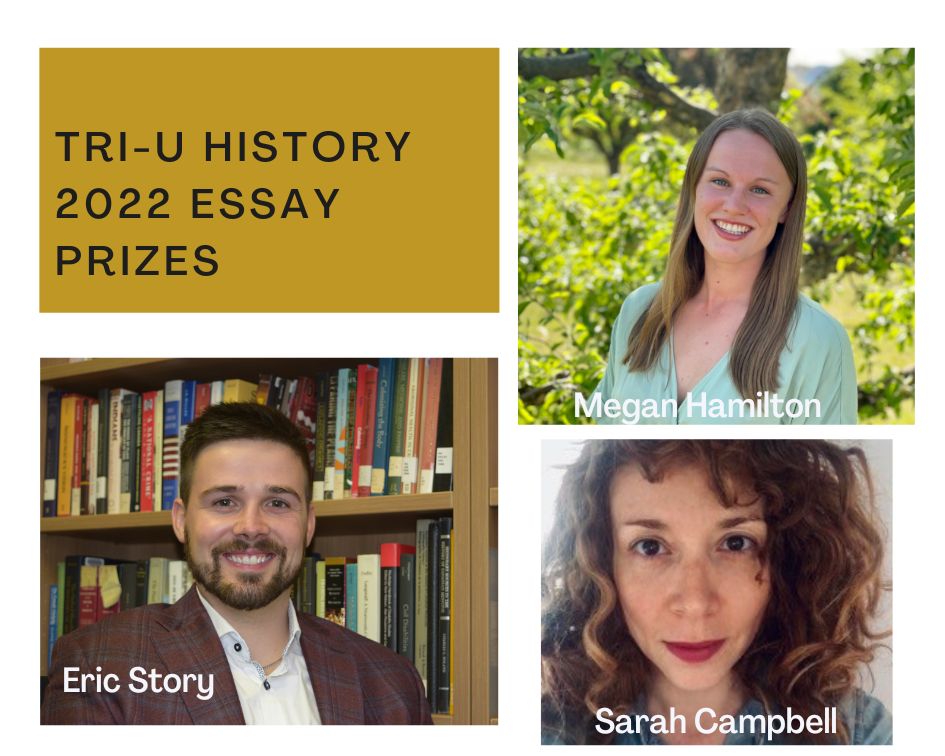
The 2022 Tri-U Essay Prize judges (Dr. Dylan Cyr, University of Waterloo, Dr. Alan McDougall, University of Guelph, and Dr. Amy Milne-Smith, Wilfrid Laurier University) awarded two prizes and an honourable mention to three students who also happen to represent the program’s three universities. The winners were announced by the program director, Dr. Jane Nicholas, at the Tri-University History Conference held on March 12. The two winning submissions explore historical experiences of inequality that came out of the First World War. The honourable mention explores existing scholarship on postwar German sex and sexuality.
Eric Story, PhD candidate from Wilfrid Laurier University, submitted an article to the competition that was published in the spring 2021 issue of the Canadian Historical Review. In “The Indigenous Casualties of War: Disability, Death, and the Racialized Politics of Pensions, 1914–39,” he follows the journey of disabled Indigenous veterans and their families after the First World War in their pursuit of war pensions. Story traces the racist discrimination they faced as Indigenous Peoples, which greatly hampered their ability to receive compensation for the losses sustained during the war. Despite these discriminatory hurdles, Indigenous veterans and their families refused to be reduced to racist stereotypes and instead emphasized the wartime corporeal sacrifices they made for Canada and the larger British Empire. This rhetoric, nonetheless, had little effect on the inequitable distribution of pension moneys to them, as the state continued to uphold a racist system of compensation.
The judges deemed Story’s paper to be “thoughtful, sophisticated, and proved a depth of research.”
Story expresses gratitude for the help and guidance received from fellow students and professors from the Tri-U who offered “kind, thoughtful, and constructive” feedback to the eventually published article that began six years ago as his MA Major Research Project (MRP) at Laurier.
The MA competition was won by Megan Hamilton, University of Waterloo, for her paper entitled “Liberal Intentions and a Colonial Mindset: The Imperial War Graves Commission in East Africa.” The paper was submitted to the course, “Global Governance in Historical Perspective (HIST 605)” and was nominated by professor Dr. Katherine Bruce-Lockhart.
Hamilton’s paper explores the 2021 report of “The Special Committee to Review Historical Inequalities in Commemoration.” The Special Committee was formed with intense reactionary speed by the Commonwealth War Graves Commission after a one-hour documentary on African war dead, entitled The Unremembered, aired in November 2019.
The task of commemorating the one million dead Commonwealth soldiers of the First World War was so great that an independent body, the Imperial War Graves Commission was created in 1917. Founded upon the novel principles of equality and democracy for all war dead, it was determined that there would be no distinction in burial by rank or nationality. However, the strict racial hierarchy of the British Empire would not be overtaken, leaving inequalities that remain unresolved into the twenty-first century. Despite previous academics having published several critical analyses of the Commission’s work, it was not until the documentary aired that any action was taken by the Commission.
Hamilton’s paper situates the Special Committee’s Report (2021) on the Commission’s commemorative inequalities within the broader narrative and literature on the topic. Not only that, but their findings are tested against the case study of the Commission’s work in East Africa in the 1920s. The paper argues that the Special Committee’s Report holds true when commemorative practices for colonial troops in East Africa are examined. The legacies of colonial rule are still very much alive, if sometimes lurking in the shadows.
The judging committee stated that Hamilton’s paper was “clear and well researched. Hamilton engaged with a long-standing historiography and was able to make the topic both timely and relevant. Her extensive use of the War Graves Commission’s reports was impressive,” they said.
Hamilton expresses gratitude to Dr. Katherine Bruce-Lockhart for her guidance and to fellow classmates in History 605 for their feedback during her paper’s formation.
This year, the committee also wished to affirm the accomplishment of Sarah Campbell, University of Guelph, with an honourable mention. Campbell’s paper entitled, “Sex is Everywhere: The Historiography of Postwar German Sexuality,” was “particularly well-argued and dynamic” in the opinion of the judging committee. Dr. Catherine Carstairs nominated Campbell’s paper that was submitted to Carstairs’ “History of Gender and Sexuality” course.
Through her exploration of the historiography of the immediate postwar period of occupation, as well as both East and West Germany up until German reunification, Campbell’s paper reveals that postwar German sexuality was never simply confined to the bedroom, but touched every aspect of political, social, and cultural life. For Campbell, “The creativity these scholars used to uncover the often-hidden aspects of people’s personal histories made this essay both inspiring to research and a pleasure to write.” From the use of Rabbi council’s letters about sex, marriage, and procreation in Jewish Displaced Persons camps, to reconstructing West German sex lives from mail-order erotica shop records, to analyses of queerness in East German film, Campbell found that collectively these histories demonstrated that sex was a place where postwar Germans re-examined their fraught history, found freedom in the present, and fought for their future.
Campbell expresses gratitude for the freedom and support provided by Dr. Catherine Carstairs that gave her the space to explore these fascinating histories.
The Tri-U History program thanks the students for their submissions and the nominating professors and judges for their work in making this year’s competition successful. PhD students submit published articles to the competition from the previous year. Faculty members teaching MA courses nominate exemplary papers submitted by students in their Fall courses.